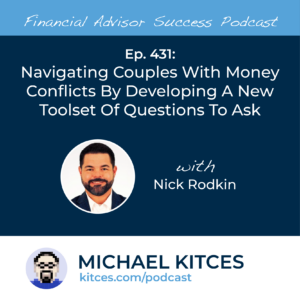Launching a new business venture is often a creative – and somewhat vulnerable – act. Whether it's opening a new firm, publishing a book, or even just posting on social media, each public-facing offering reflects many hours of ideation, refinement, and effort. When preparing to launch, advisors must typically answer two core questions: "Who will show up for this?" and "Will the people who do show up like it and get it?" A good way to address both questions is to ask for feedback – but the real challenge is knowing who to ask, and when.
In the 161st episode of Kitces and Carl, Michael Kitces and client communication expert Carl Richards discuss how and when to ask for feedback, how to use it constructively, and when it's better to simply act and launch.
As a starting point, gathering a sufficient volume of responses is crucial when asking for feedback. Negative feedback often feels ‘louder' than positive feedback, but a single critical opinion may not reflect a broader sentiment – people simply have a variety of preferences. Advisors can mitigate overreacting to one-off responses by ensuring they collect enough responses to identify real patterns, which can also prevent an advisor from rebuilding everything in response to a single opinion. Furthermore, ensuring that feedback is coming from the ‘right' people is just as important. For example, if a firm launches a new offering for its core clientele – dentists near retirement – then it may not be helpful to ask newly minted doctors what they think of the offering. The doctors may not find the offering helpful or relevant… and that's okay. Feedback from outside the target audience may be interesting, but it isn't always relevant!
In some cases, behavioral data may also be a helpful source of useful feedback. Observing the topics and offerings that clients actually engage with may offer better clues about what they find valuable. Doing more of what connects – and less of what doesn't – can be an easy, effective way to refine offerings over time.
Finally, there may be times when the best audience to build for is the advisor themselves. Many advisors build firms with fee service models that resonate with them. At times, what's needed isn't feedback – it's confidence. For example, there may come a point where an advisor may not need feedback as much as a rallying cry to move forward. Then, once something is launched, the advisor can watch for how prospects and clients react to their offerings and take that as implicit (or explicit) feedback.
The key point is that feedback can be a powerful tool to refine offerings and creative ventures, but only when it comes from the right people at the right stage of the process. When thoughtful feedback comes from a core part of the audience, it can be a helpful resource for advisors to shape services that resonate with their target audience. And, ultimately, those points of feedback can help advisors build a stronger, more relevant product – amplifying their impact in the long term!




